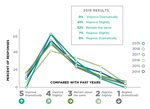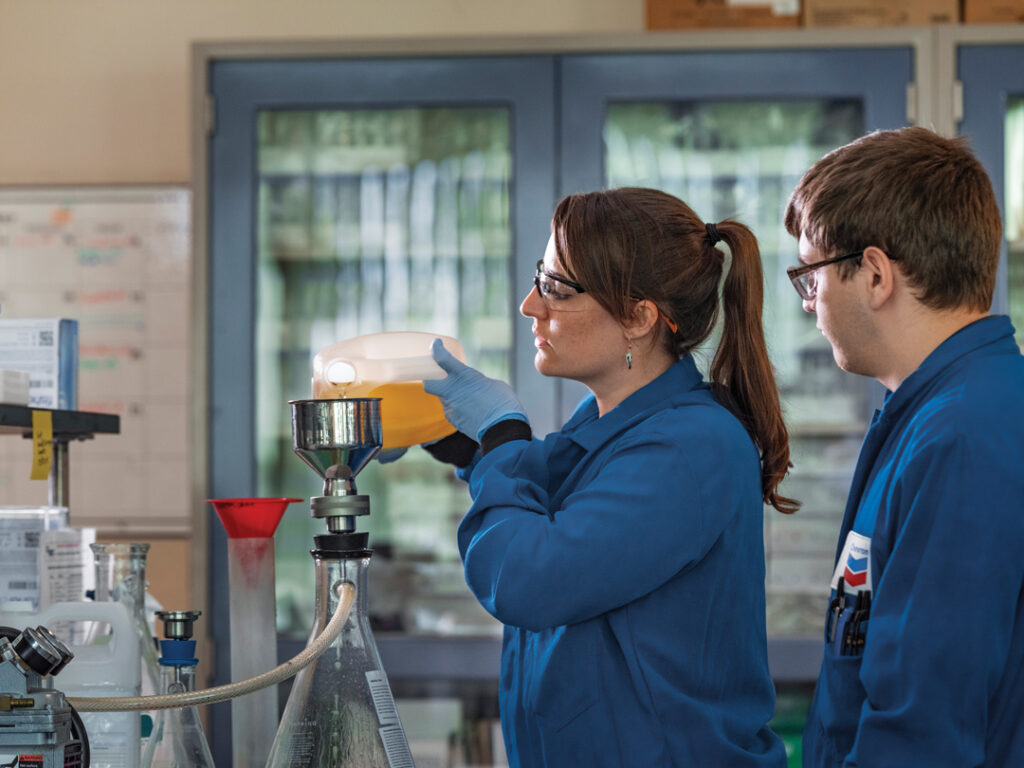How is the local economy doing? Business Record readers answer.

BUSINESS RECORD STAFF Jan 20, 2020 | 9:44 pm
6 min read time
1,518 wordsBusiness Record Insider, Economic Development
We asked our readers to give us their thoughts on Iowa’s economy in year ahead – do they think it will improve, regress or stay at the same level? The 2020 results of the survey, in its ninth year, are not scientific but paint a picture of what other leaders think as you make plans for your own business.
What will the impact of the economy be on your particular industry?
Mike Ralston, president, Iowa Association of Business and Industry
No matter how moderate, growth in Iowa’s manufacturing industry means good jobs for Iowa communities and economic stability for our state.
Todd Kielkopf, president, Kielkopf Advisory Services
Equity markets and low interest rates will continue to support at-risk capital flowing into biotech and ag innovation sectors.
Joey Beech, executive director, Ankeny Economic Development Corp.
The Iowa economy is in good shape, but uncertainty is creating a headwind. Businesses and consumers put off large purchases when they are uncertain about the future. Global and national turmoil fuels uncertainty. Trade agreements help offset turmoil. The question is by how much? Fortunately, Iowa benefits from being a safe place for national and international businesses to invest.
Tom Flynn, president, Lessing-Flynn
A better economy means people are willing to invest in growing their companies or starting new ones. One way to promote growth is through advertising and marketing — developing their brand, investing in their website, launching new products, becoming more aggressive with their advertising, etc.
Aaron Kennedy, president and CEO, Flynn Wright
Positive economic momentum almost always translates into additional opportunities for most people in the marketing industry. Businesses that want to take full advantage of heightened activity understand the critical role that strategic marketing plays in driving performance and elevating ROI.
Leah Glasgo, president and CEO, UnityPoint Health-Fort Dodge
While the economy has an impact on all industries to varying degrees, the industry of health care is being transformed in large part by consumer demand. In rural areas, like UnityPoint Health-Fort Dodge, we have responded by expanding orthopedics through a partnership, hiring 18 providers in 2019 and another eight will join us in 2020 or 2021, and continuing our investment in telemedicine.
Kirk McCollough, chairman, Seneca Foundry
Currently in the decline but will improve in the first quarter.
Julianna Curtis, volunteer engagement coordinator, Greater Des Moines Habitat for Humanity
For the housing development/affordable housing industry, it could have varied effects depending on legislation. An improvement in the economy may increase those in the lower-income bracket seeking more affordable homes.
Adam Boeding, vice president, Midwest Heritage Bank
I believe lessening of Chinese trade tensions will ease the burden on the ag industry. This will translate into stronger cash flow for our ag clients, restoring some profitability to their operations, especially in the grain markets. This of course is contingent upon a lowering of tariffs, as the current trade deal is still dependent on price competitiveness with the global markets that are currently supplying the Chinese.
Keith Gredys, chairman and CEO, the Kidder Co.
The overall national economy continues to expand, although at a slower pace. We are multi-regional business consultants and advisers specializing in more sophisticated 401(k), cash balance, ESOP and deferred compensation plans along with overall Business Planning Solutions. [We need to meet] our clients’ need to find more ways to optimize their financial and human resources to fulfill their strategic plans. We are seeing a greater need for more of the tailor-made business solutions that we provide.
Eric Burmeister, executive director, Polk County Housing Trust Fund
The housing industry will be busy trying to keep pace with rapid increases in new households moving to Central Iowa. Next year will need to set a new record for units delivered.
Kim Grzywacz, director of sales, CIT Signature Transportation
We will see an increase in revenue of at least 10%.
Mackenzie Ryan, owner and chief storytelling officer, M Ryan Mediaw
Marketing spending is expected to stay strong and, if recent trends continue, could rise. I believe we’ll continue to see a steady increase in marketing in Iowa — it’s a noisier world, and it’s harder to grab a customer or client’s attention than ever before. In fact, on a national scale, there’s been a 13% increase in domestic marketing spending in marketing budgets since 2012, according to Deloitte’s CMO Survey. In February 2012, domestic marketing spending was 77.6% of budgets; by August of 2019, it rose to 87.6%, the survey says. Why is that? Internet sales increased from 8.4% to 13.4%, the survey reports. Attention is online, and companies are starting to recognize that. I’d argue that savvy companies are spending even more online because that’s where the consumer’s attention is — in our phones.
Drew Kamp, vice president, Ames Chamber of Commerce
For the housing development/affordable housing industry, it could have varied effects depending on legislation. An improvement in the economy may increase those in the lower-income bracket seeking more affordable homes.
Steve Cruse, president, Iowa Business Growth Co.
We are growing in record manner, should continue to do so.
Kayla Kovarna, communications, marketing and air service development manager, Des Moines International Airport
With a strong economy, I’d expect to see continuous increases in passenger traffic at the airport. We are currently anticipating surpassing 3 million passengers in 2020; however, we know a recession would slow both business and leisure air traffic in our state.
Creighton Cox, manager of business development, Turner Construction Co.: Iowa
$5 billion — that’s the potential construction costs of existing, planned and proposed major projects starting (hopefully) around the metro in the next two to seven years. 2020 will see a few of those, like the Urban Loop and Project Blue Jay, be completed, and data centers in Altoona and West Des Moines be continued, but many new construction projects will remain in the planning stages, like the airport terminal, Des Moines soccer stadium, luxury high-rise apartments, Hickman interchange, area entertainment venues and districts and the Apple data center. Numerous smaller projects will keep the design and construction industry busy and improve the Iowa economy slightly, but it’s the next five to 10 years that I think we’ll see dramatic improvement once the majority of these projects are under construction or completed and operational.
Jed Gammell, vice president of risk management, Lincoln Savings Bank (LSB Financial Services)
Incremental growth among most operations, with isolated, but an increased number of, softer spots throughout. Property and auto rates continue to rise, which directly erode customer profits.
Jackie Norris, president and CEO, Goodwill Industries of Central Iowa
Attracting and retaining talent. To be successful, employers need to be open to hiring often overlooked candidates — people with disabilities, those with criminal backgrounds and immigrant/refugee populations.
Tom Gayman, broker and owner, Performance Realty LLC
Workforce growth will continue to be a major issue for companies in 2020. Companies may retract from office space expansion plans due to a shortage of workforce talent. Advances in technology, office layouts and remote working alternatives will reduce the need for more office space.
Linda Santi, grant writer and consultant, Winnebago Comprehensive Healthcare System and contract work
Stasis.
Richard Hurd, president, Hurd Real Estate Services Inc.
I believe the commercial real estate industry will continue to prosper as it has in 2019 through the election cycle in 2020.
Jennifer Cooper, vice president and manager of commercial real estate, Bankers Trust Co.
My view of the economy is skewed to new commercial real estate developments and commercial real estate financing in general. Despite the market’s continued low interest rate outlook, election year volatility tends to result in “caution mode” for most real estate developers and investors, and their potential tenants. Due to overall market liquidity and increasing attention by out-of-state investors in Des Moines commercial real estate, sales volume will likely continue to be strong.
Jim Plagge, CEO, Bank of Iowa
Loan quality should remain strong in the commercial and real estate sectors but continue to be somewhat strained in the ag sector. Interest rates have returned to a more normal upward curve versus an inverted curve during much of 2019, thereby providing more stability to the community banking sector.
Jeff Rose, president and CEO, American Bank & Trust
The banking industry in Iowa will experience slow to modest growth as flat or reduced interest rates will continue to remain near historically low levels, compressing profit margins. This will facilitate additional consolidation of Iowa financial institutions as overhead reductions will be necessary to meet expectations.
Suzanne Behnke, executive director, the Iowa Center for Public Affairs Journalism – IowaWatch
Journalism will continue to struggle and nonprofit news and entrepreneurial news outlets will pop up.
Kevin Pokorny, owner and consultant, Pokorny Consulting
Create more stress and uncertainty in people’s lives. As a result, people will search for personal coaching to manage the stress and uncertainty.
Jim Green, client lead/principal, Mercer
From an employer standpoint, a likely return to a more concerted effort on finer points of cost (e.g., eligibility waiting periods, benefit effective and termination dates, vendor claim audits, out-of-network charges and claim processing, supplemental fees, etc.), despite the need to focus on a tighter labor market.











